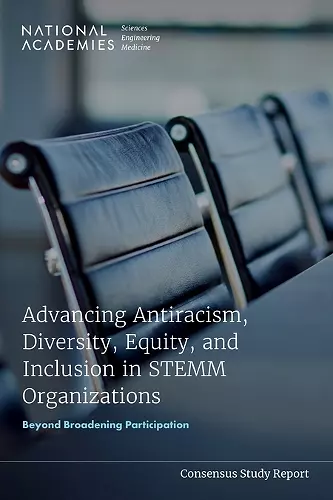Advancing Antiracism, Diversity, Equity, and Inclusion in STEMM Organizations
Beyond Broadening Participation
Division of Behavioral and Social Sciences and Education author Board on Behavioral, Cognitive, and Sensory Sciences author National Academies of Sciences, Engineering, and Medicine author Committee on Advancing Antiracism, Diversity, Equity, and Inclusion in STEM Organizations author Susan T Fiske editor Layne A Scherer editor Emily A Vargas editor Gilda A Barabino editor
Format:Paperback
Publisher:National Academies Press
Published:28th Jul '23
Should be back in stock very soon

Individuals from minoritized racial and ethnic groups continue to face systemic barriers that impede their ability to access, persist, and thrive in science, technology, engineering, mathematics, and medicine (STEMM) higher education and workforce. Without actively dismantling policies and practices that disadvantage people from minoritized groups, STEMM organizations stand to lose much needed talent and innovation as well as the ideas that come from having a diverse workforce.
A new report from the Board on Behavioral, Cognitive, and Sensory Sciences examines the backdrop of systemic racism in the United States that has harmed and continues to harm people from minoritized groups, which is critical for understanding the unequal representation in STEMM. The report outlines actions that top leaders and gatekeepers in STEMM organizations, such as presidents and chief executive officers, can take to foster a culture and climate of antiracism, diversity, equity, and inclusion that is genuinely accessible and supportive to all.
Table of Contents- Front Matter
- Summary
- 1 Introduction
- PART I
- 2 The Historical and Contemporary Context for Structural, Systemic, and Institutional Racism in the United States
- 3 Population Data and Demographics in the United States
- PART II
- 4 Lived Experiences and Other Ways of Knowing in STEMM
- PART III
- 5 Minoritized Individuals in STEMM: Consequences and Responses to Racial Bias and How STEMM Professionals Can Help
- 6 The Gatekeepers of STEMM: How Individual Bias and Inequality Persist and How STEMM Professionals Can Help
- 7 Diverse Work Teams: Understanding the Challenges and How STEMM Professionals Can Leverage the Strengths
- 8 Understanding Organizations and the Role of Leadership in Developing a Culture of Antiracism, Diversity, Equity, and Inclusion
- 9 Research Agenda
- Appendix A: Increasing Participation of Underrepresented Groups in STEM: Themes from Four Recent National Academies Reports
- Appendix B: Comparison Tables of Science and Engineering Degrees Earned by Race and Ethnicity and Gender in 2011 and 2019
- Appendix C: Process for Panel's Interviews
- Appendix D: Glossary
- Appendix E: Committee and Staff Biosketches <
ISBN: 9780309696692
Dimensions: unknown
Weight: unknown
342 pages